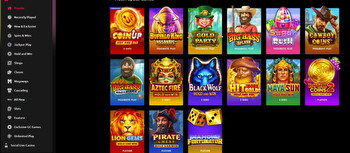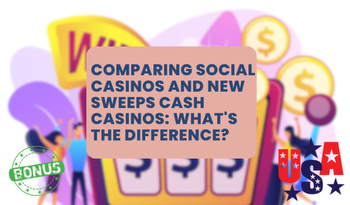Real Money vs. Social Online Casinos: Key Differences and Pros and Cons
In the ever-evolving realm of online entertainment, the casino industry stands out as one of the fastest-growing sectors. With this digital surge, the landscape of gambling has expanded, presenting enthusiasts with two main avenues: real money and social online casinos. Delving into their intricacies can provide clarity on which might best suit your preferences and thrill-seeking appetite.
Real money online casinos are digital platforms that allow individuals to gamble using actual currency from the convenience of their devices. Unlike their traditional brick-and-mortar counterparts, these online platforms offer a wide range of casino games, from slots to table games like blackjack and poker, all accessible via a computer, smartphone, or tablet.
The defining characteristic of real money online casinos, including those Techopedia picks and countless others, is the use of real currency. Players deposit funds into their casino accounts, place bets with those funds, and if they win, they can withdraw real money. This is in contrast to social or virtual casinos where players might wager with virtual coins or points without any monetary value, as we’ll explain in more detail later.
Real money online casinos typically operate under licenses issued by regulatory bodies, ensuring that the games are fair, and players’ funds and personal information are secure. They also offer various incentives, such as sign-up bonuses, promotions, and loyalty programs to attract and retain players.
All in all, these platforms offer as close to the real casino experience you’ll get without leaving the home. From live dealer games where croupiers dealing the cards are broadcast live to your device, to RNG roulette wheels, real money online casinos offer a huge range of games just like you’d find in your local casino.
The industry shows no sign of slowing down, and has been thriving in recent years. In the UK alone, to give one example, the gross gambling yield (GGY) from remote casinos almost doubled from £2.4 billion in 2015-16 to £4 billion in 2020-21.
- Regulation: Reputable online casinos operate under stringent regulations. Such oversight ensures fairness in games and offers players some peace of mind. Properly licenced online casinos keep players’ funds safe, pay out when a win happens, and keep players’ personal and financial information secure.
- Variety: Real money casinos usually have an expansive roster of games, from classic slots and blackjack to newer innovations such as game show-like games, ensuring players never have a dull moment. In fact, many of the best real money online casinos will have hundreds, or even thousands, of slot games to choose from. They might also have close to 100 live games to choose from, so there’s always something you’ll enjoy.
- Potential for Monetary Gains: Beyond the immersive experience, the primary appeal of these platforms is the prospect of winning real money. Of course, just like in a real casino, it’s never guaranteed, and this shouldn’t be the primary reason for playing. Instead, visiting an online casino should be seen as fun and entertaining, rather than a way to make money.
- Rewards and Incentives: Many platforms entice players with a mix of sign-up bonuses, loyalty rewards, and ongoing promotions, adding value to the user experience. These can allow players to enjoy new games without spending real money, or to get better value by increasing the length of time they can play for without depositing more funds.
- Financial Risks: While the potential for gain is genuine, so is the risk of loss. Not every gamble yields a positive outcome, and losses can quickly accumulate. That’s why it’s vital to set a strategy for managing your bankroll before starting to play at an online casino. It’s easy to lose track of your wagers, so setting deposit limits on your account and monitoring how many spins you’ve played can help.
- Fees & Delays: Withdrawing your winnings might not always be instantaneous. Some casinos have processing fees or extended waiting periods, depending on the payment method used.
- Licensing and Geo-Restrictions: Players might find themselves barred from certain platforms or games based on their geographical location, due to varying regional regulations. Online casinos are not legal everywhere, for example, they’re only permitted in 5 US states at the time of writing, so they’re not always accessible. This is in fact part of the reason why social casinos came about, as we’ll explain next.
Social online casinos might mirror their real money counterparts in terms of appearance and game offerings, but the stakes here are virtual. These platforms focus on community engagement and entertainment value. Instead of cash, players earn tokens, points, or virtual coins. While they can’t line your pockets, they can provide hours of amusement and offer a platform for friendly competition.
Some, like sweepstakes casinos, lie halfway between social and real money casinos, allowing the possibility to play for real money without technically gambling real funds. How? Remember how we said that real money online casinos aren’t legal everywhere? Sweepstakes casinos operate within a legal gray area by offering players the chance to buy virtual currency or sweepstakes tickets that can be used for gameplay. While this virtual currency has no direct monetary value, players can often redeem it for sweepstakes entries.
If they win, they’re awarded in the form of cash prizes or gift cards. Essentially, instead of directly betting with real money, players participate in a sweepstakes model, which circumvents typical gambling regulations while still allowing for real-world rewards.
Although they might not sound as appealing as real money casinos, the social casino market is big business. The industry is worth around $10.5 billion already, and it’s set to surpass $36 billion by 2030. It has a massive global reach, too. From North America to Saudi Arabia and South Africa, these platforms are booming in all corners of the globe.
- No Financial Risk: The absence of real money means players can indulge as much as they like without risking real funds.
- Social Features: These platforms are often designed with community in mind, offering features like chat rooms, leaderboards, and tournaments to foster interaction.
- Ideal for Novices: Newcomers can familiarize themselves with the dynamics of casino games without the financial pressures, making it a safe training ground. For example, players can get a feel for how slots work or practice their blackjack strategy before playing for real money.
- Wider Accessibility: These platforms typically encounter fewer regulatory restrictions, making them accessible to a broader range of players globally. They’re not subject to the same strict licencing requirements as real money platforms.
- Lack of Tangible Rewards: The satisfaction of a win is short-lived when the jackpot is virtual and can’t be spent in the real world. Some users therefore tire of these platforms quickly.
- In-App Purchases and Advertisements: To monetize, these platforms often incorporate ads or promote in-game purchases, which can sometimes detract from the gaming experience, especially when they are excessive.
- Differing Game Mechanics: Without the weight of real money on the line, some games might be tweaked or might not emulate the authentic strategies and odds of traditional casinos.
The decision between these two forms of online casinos boils down to individual preferences. If you relish the tangible thrill of risk and reward, a real money casino might satiate your appetite. Conversely, if your goal is light-hearted entertainment with a sprinkle of competition, social online casinos are your best bet.
Weigh the pros and cons, and always approach with an understanding of your personal limits and what you seek in a gaming experience.


































